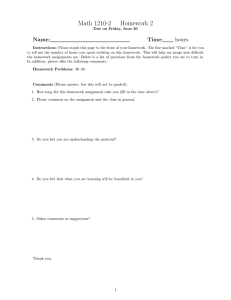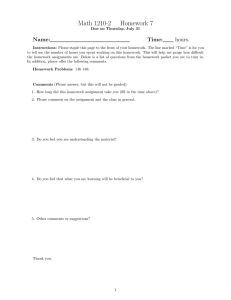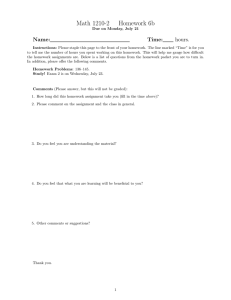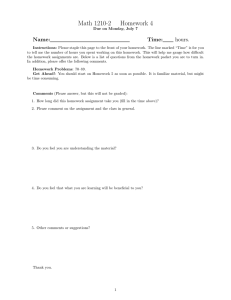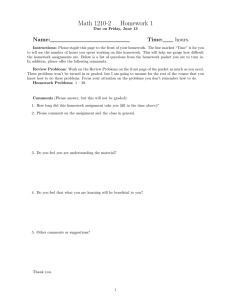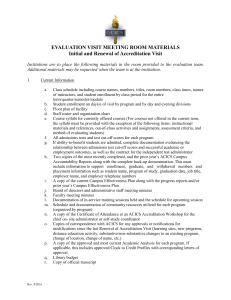Homework Assignments
advertisement
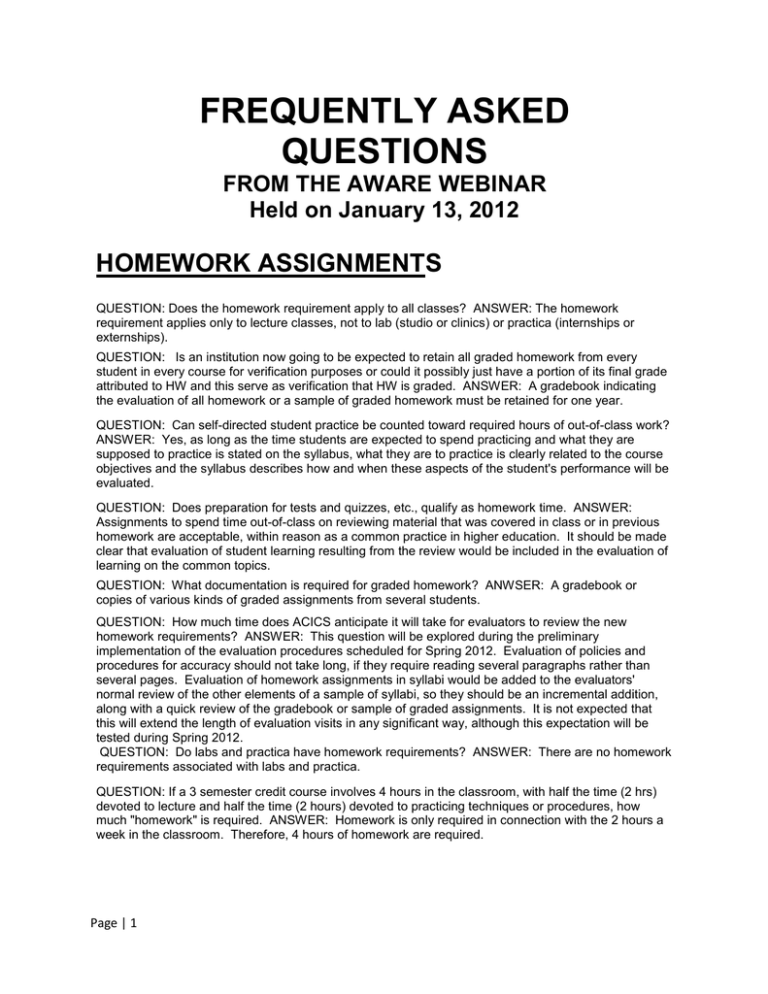
FREQUENTLY ASKED QUESTIONS FROM THE AWARE WEBINAR Held on January 13, 2012 HOMEWORK ASSIGNMENTS QUESTION: Does the homework requirement apply to all classes? ANSWER: The homework requirement applies only to lecture classes, not to lab (studio or clinics) or practica (internships or externships). QUESTION: Is an institution now going to be expected to retain all graded homework from every student in every course for verification purposes or could it possibly just have a portion of its final grade attributed to HW and this serve as verification that HW is graded. ANSWER: A gradebook indicating the evaluation of all homework or a sample of graded homework must be retained for one year. QUESTION: Can self-directed student practice be counted toward required hours of out-of-class work? ANSWER: Yes, as long as the time students are expected to spend practicing and what they are supposed to practice is stated on the syllabus, what they are to practice is clearly related to the course objectives and the syllabus describes how and when these aspects of the student's performance will be evaluated. QUESTION: Does preparation for tests and quizzes, etc., qualify as homework time. ANSWER: Assignments to spend time out-of-class on reviewing material that was covered in class or in previous homework are acceptable, within reason as a common practice in higher education. It should be made clear that evaluation of student learning resulting from the review would be included in the evaluation of learning on the common topics. QUESTION: What documentation is required for graded homework? ANWSER: A gradebook or copies of various kinds of graded assignments from several students. QUESTION: How much time does ACICS anticipate it will take for evaluators to review the new homework requirements? ANSWER: This question will be explored during the preliminary implementation of the evaluation procedures scheduled for Spring 2012. Evaluation of policies and procedures for accuracy should not take long, if they require reading several paragraphs rather than several pages. Evaluation of homework assignments in syllabi would be added to the evaluators' normal review of the other elements of a sample of syllabi, so they should be an incremental addition, along with a quick review of the gradebook or sample of graded assignments. It is not expected that this will extend the length of evaluation visits in any significant way, although this expectation will be tested during Spring 2012. QUESTION: Do labs and practica have homework requirements? ANSWER: There are no homework requirements associated with labs and practica. QUESTION: If a 3 semester credit course involves 4 hours in the classroom, with half the time (2 hrs) devoted to lecture and half the time (2 hours) devoted to practicing techniques or procedures, how much "homework" is required. ANSWER: Homework is only required in connection with the 2 hours a week in the classroom. Therefore, 4 hours of homework are required. Page | 1 QUESTION: In the online space how are you going to differentiate "in class" versus "out of class" when the vast majority of the work, even homework, is potentially being completed in the learning management system? ANSWER: QUESTION: What details should the syllabus contain about out-of-class work? ANSWER: The syllabus should describe the specific work involved, when it is due, how much time the student is expected to spend completing the work, and, if it not self-evident, the intended learning objective of the work and how it will be graded. QUESTION: If a reading assignment is a component of out-of-class work, must it be graded or otherwise explicitly evaluated to count? ANSWER: There must be evidence that the intended learning outcome of the reading assignment has been evaluated in some manner. Reading by itself is not sufficient. If a reading assignment is on a topic that is also covered during class, and there is an evaluation that covers the result of the two together, then this should be made clear in the gradebook or copies of the evaluation. If the reading assignment covers different material from the class, then the evaluation should also cover this material. QUESTION: How is it to be determined how long "out of class" assignments will take...for example, studying a chapter, writing a paper...? ANSWER: The syllabus should indicate how long the student is expected to spend on the assignment in order to achieve the intended learning outcomes (and therefore receive a satisfactory grade). The accuracy and reliability of that judgment is evaluated by the visiting team on the basis of whether the assignments comply with commonly accepted practice in higher education. If the assignment is innovative, evidence from internal or external research should be provided that the learning outcomes of the assignment and amount of work it represents are at least equivalent to those of a commonly accepted practice. QUESTION: Can you define the difference between a Credit, Contact Hours, and Credit Hours? ANSWER: A Credit or Credit Hour is defined in terms of the number of hours of work required. The Federal definition for purposes of financial aid differs from the ACICS definition for academic purposes. Contact Hours are the hours of class in which a student receives direct instruction through personal contact with a faculty member. QUESTION: How much homework must be assigned to a student who is in class 5 days a week taking 3 hours of lecture and 2 hours of lab? ANSWER: The student should be assigned 30 hours of homework, corresponding to the 15 hours of lecture. No homework is required with the 10 hours of lab. Therefore, the total hours of work expected of this student would be 55 hours. The total credits would amount to 15 for the lecture classes and 1.5 for the lab, or 16.5 credits, which would certainly be at the high end for a full-time student. QUESTION: If an institution is awarding financial aid funding for degree programs based on credit hours, is the institution required to submit a clock to credit hour conversion application for the program? Or is ACICS only currently reviewing documentation for credit-bearing diploma programs? ANSWER: ACICS is evaluating homework required for all credit-bearing programs, including (1) all degree programs, (2) diploma programs that transfer, and (3) diploma programs that include some homework for purposes of clock-to-credit hour conversion. QUESTION: Is there a difference in homework requirements between general education classes and core program classes. ANSWER: No difference, as long as they are both part of a credit-bearing degree program. QUESTION: How does the ACICS Academic definition of credit differ from the Federal definition? ANSWER: The ACICS definition differs in two ways. First, no specific hours of homework or the equivalent is required. Second, the definition applied only to credit used for academic purposes, not to credit used for purposes of awarding federal financial aid. Page | 2 QUESTION: If a student is assigned to read a textbook chapter for the next class, does "participating in discussion" the next class session "count" as a means of determining that the assignment was done? ANSWER: As long as the discussion involves the reading assignment and is officially evaluated by the instructor as a portion of the student's overall grade, it would count as evidence of student achievement of intended learning outcomes. QUESTION: How does this requirement apply to diploma or certificate programs? (less than one year in length). ANSWER: If students in the program can transfer into a degree program at the same institution, the homework requirements in the credit hour definition apply. If the program does not transfer but includes in the total hours a small amount of homework, the conversion ratios would apply and the homework would be evaluated. QUESTION: Is there an upper limit ACICS will accept to the number of hours a student enrolls for? Would 20 of class and 40 of homework for a total of 60 be acceptable? ANSWER: ACICS imposes no limit on the number of credits for which a student can register, since some student may be capable of spending more time than others. As a general practice, however, students who do not have 45 hours a week available for a semester and who take a full load anyway, would be more likely to fail some courses and drop out, which would negatively impact a school's retention rate. QUESTION: When will the homework requirements be fully in place and implemented? ANSWER: We expect that they will be in place and implemented, perhaps in a pilot mode, by Spring 2012 and finalized by July 1, 2012, as required by the US Department of Education. QUESTION: My first term students have a 29 contact hour week: 13 hours of lecture (which translates into 26 hours of outside work. Then they have 10 hours clinic and 6 hours lab.13 + 26 + 10 + 6 = 55 hours overall of class and homework. Does that seem reasonable to you? ANSWER: No, it does not seem reasonable. Perhaps some of the lecture material can be covered through out-of-class work, reducing both the hours of lecture, and the required hours of out-of-class work? QUESTION: Are clock-hour schools offering programs over one-year in length, receiving Title IV, required to report the out-of-class hours? ANSWER: No, clock hour programs have no homework requirements. QUESTION: How will evaluators determine that 2 hours of out of class work have been completed for each hour of class time? ANSWER: By reviewing the grading of homework and by interviewing faculty and students. The grading of homework should demonstrate that student who spend the expected amount of time have achieved the required learning and the amount of time to achieve the required learning should be what is expected as a common practice in higher education . Faculty and students should be satisfied that students are generally spending enough time on homework to accomplish the intended learning outcomes. QUESTION: Does it have to be 2 hours each week per 1 hour of credit, or a total amount of homework time--averaged out throughout the term? ANSWER: Homework will be evaluated within each course. Evaluators will determine if the total hours of required homework have been assigned, either on a weekby-week basis or, if there is variation, across the term. QUESTION: What sorts of activities would qualify as classroom or direct faculty instruction within the structure of an online course? ANSWER: Activities intended to achieve the same learning objectives as a comparable on-ground course. QUESTION: What constitutes a contact hour of direct faculty instruction in an asynchronous hybrid class? ANSWER: One of the hours that students in the class are expected to spend online working on material comparable to what a synchronous or onsite lecture course would cover in class. QUESTION: Other than recording the out of class work grade, is the institution required to maintain any other documentation to support evidence of students doing and turning in the out of class work? ANSWER: No, unless the grade combines an evaluation of both in-class and out-of-class work, in which case an example of graded work would be necessary to documenting that the grade includes an evaluation that goes beyond in scope or depth what might be learned strictly in class. Page | 3 QUESTION: Once approval of the conversion ratios is final, will you base your conversion on total hours including homework and divide by 25 or will you take the instructional time and divide by 20? ANSWER: Evaluators will determine whether the homework assignments reasonably approximate the number of hours of homework that is stated on the syllabus and whether the application of the conversion ratios is accurate with regard to the stated limits on (1) the minimum number of instructional hours (20 for a quarter credit) (2) the allowable range of homework (0-5 hours), and the total required hours for converting to one financial aid credit (25). QUESTION: Are diploma/certificate programs receiving Title IV funding required to meet homework requirements? ANSWER: If students in the program can transfer credits to a degree program offered at the same institution, then all lecture courses with direct faculty instruction are required to add homework according to the Federal definition of a credit hour. If the credits are not transferrable in that manner, the program is eligible for clock to credit hour conversion and the campus may or may not choose to count some hours of homework toward the conversion ratios, as explained in Federal regulations. QUESTION: What criteria are used to measure the amount of time spent on homework, for example reading a chapter and answering questions at the end? ANSWER: (1) the amount of time stated on the syllabus that students are expected to spend on the assignment, (2) whether this is a commonly accepted practice in higher education, (3) the reliability of the procedure for establishing or reviewing the assignment (e.g., publisher's recommendations), and (4) the comments of students and faculty as to whether students are expected and able to spend enough time on homework to achieve intended learning objectives. QUESTION: Are research papers acceptable as homework? ANSWER: Yes, as long as they support the course objectives and are graded. COMMENT: (Administrator) - Isn't it better to consider that, at a minimum, outside of class preparation should be 25% of the total in-class hours. RESPONSE: This interpretation will be added to the explanation of how to apply the definition. COMMENT: (Administrator) - Will ACICS be revising its own definition of Credit as well? RESPONSE: The Council discussed this possibility and decided to retain its current definition. COMMENT: (Administrator) - Can ACICS do more training of evaluators on the clock-to-credit hour conversion requirements? We often have to teach them about this when they are on-site. RESPONSE: Training will be provided before evaluators begin the review of homework requirements and conversion ratios. COMMENT: (Administrator) - What is the ACICS position on the new definition and it's difference from the 10 hours of lecture, 20 hours of lab, and 30 hours of externship? RESPONSE: The specification of required hours of homework for lecture classes is a U.S. Department of Education regulation for purposes of awarding federal financial aid. ACICS is retaining its definition of credit for academic purposes and the 20 and 30 hour equivalencies for labs and practica. COMMENT: (Administrator) - As career colleges, we have many individuals who work full time and/or do not have computers at home. How do you suggest we explain to a student why schools developed specifically for their needs are now being held to homework standards exceeding those of local community colleges? RESPONSE: All colleges and universities participating in Title IV financial aid must adhere to the new homework standards. They represent an opportunity to ensure that students at career colleges meet or exceed the same expectations for learning as students in other colleges. Colleges might consider how to help students succeed in meeting these new standards, including providing access to computers, when necessary, for students who have none. COMMENT: (Administrator) - Student learning from study and research time in heavily theoretical courses cannot be demonstrated through tangible evidence like completing and grading a worksheet. RESPONSE: Student achievement of intended learning outcomes in heavily theoretical courses can be evaluated in a number of ways, including quizzes, essay examinations and writing assignments. Page | 4 COMMENT: (Administrator) - How is the Council accounting for the fact that some currently enrolled students may not be up to the increased homework load because they need to hold jobs. Retention may go down, yet retention standards are going up. RESPONSE: The increase in Retention rates standards reflects the fact that retention rates have gone up at ACICS-accredited institutions since the current standards were set. The homework requirement is a Federal regulation over which ACICS has no control. COMMENT: (Faculty) - The Council should explain how project-based homework would count and how it would be quantified. RESPONSE: ACICS intends to publish on its website an Accreditation Advisory that will include examples of different types of assignments such as project-based homework. Page | 5
